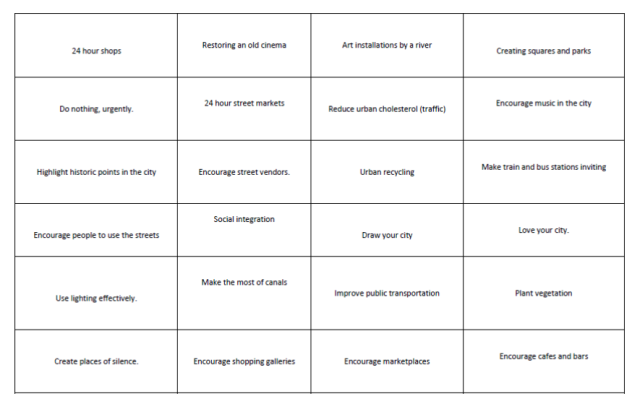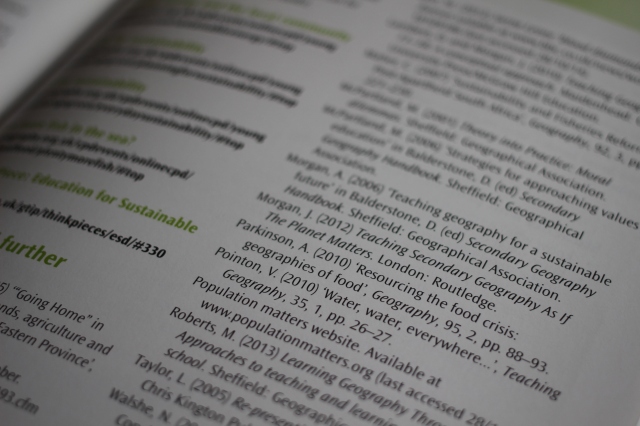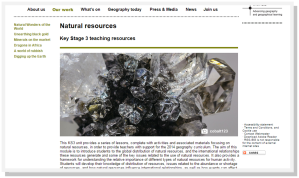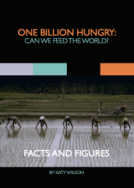I often get asked by students from secondary school to postgraduates about strategies to gain a broader knowledge of geographical issues, and how to ‘read around the subject’ as they are often instructed to do. Many students cite lack of spare time to sit and read in addition to the work they have been set by teachers and lecturers. While continuing to read is important I find listening to podcasts a great way to learn about a wide range of topics from Californian droughts, to robots in the workplace, to the future of energy production. I tend to listen to the podcasts when I’m exercising, walking to work or travelling.
I’ve discussed this with various groups of students and many of them have tried switching from listening to music to a podcast on the way to school, or when they go for a run, and have also found it a useful way to learn about different topics and expand their geographical knowledge. I recognise that it’s important to have ‘down time’ and sometimes you don’t want to learn any more on the way to or from work, but if you’re looking for an easy way to learn about all sorts of different topics then podcasts are a really easy tool to help you (or your students do this. There are lots of relevant podcasts for geographers out there, but those I listen to most frequently include:
1. BBC Business Daily. The website describes this podcast as ‘the daily drama of money and work from the BBC’ and I really don’t think this does it justice. Yes, the podcast does discuss relevant issues to the business world, but the diversity of topics is vast, and they usually focus on topics in the news providing a wealth of up to date case study material, and insights into geographical issues that are happening in the world today. The podcast is around 17 minutes long and recent relevant episodes include: ‘Fast Growing Mozambique’, ‘Paris Climate Pact: Corporate Winners and Losers’ ‘Gold and Oil in Ghana’, ‘California: Fruits, Nuts and Drought’ and ‘The Economics of Migration’.
2. From Our Own Correspondent. This includes analysis from a host of the BBC’s correspondents, journalists and writers about various stories in the headlines. It’s usually presented by Kate Adie and lasts for around 28 minutes. To get a flavour of the type of material in the podcast I would highly recommend the recent ‘Special Boxing Day Edition’ which looks back at some of the various historic ‘From our own correspondent’ despatches, or one of my favourite episodes from 2015: ‘The Night Train in Luxor’ which includes insight from Egypt, the UK, China, South Sudan, Australia and Afghanistan.
3. BBC Documentaries. There are a wide range of documentaries over the year covering all sorts of topics, but again they often have issues of interest to geographers at their heart. For example, recent relevant episodes include, ‘Young, clever and Libyan’ which follows tech graduates in Libya and their hopes for rebuilding their economy, ‘The year of migration’ which discussed the migration patterns witnessed in 2015 from Africa, the Middle East and Asia, ‘Online Shopping Indian style’ exploring the recent growth in internet shopping in India, ‘Changing Climate change: Politics’ examining key issues around climate change in the political sphere.
4. TED Talks. Drawing from the various TED conferences around the world, these podcasts have lots of short talks from ‘the world’s leading thinkers and doers’, lots of inspirational people, or people with big ideas at least. You can also watch the videos on the website as there are often visual presentations to go with the audio. Some recent relevant episodes include: ‘The four fish we’re over eating – and what to eat instead with Paul Greenberg,’ ‘My country will be underwater soon by Anote Tong’, ‘Climate change is happening. Here’s how to adapt from Alice Bows-Larking’ and ‘A year reading a book from every country in the world’ (a talk which inspired my project for the year on one of my other blogs, ‘A Geographer’s Kitchen’).
5. The Inquiry. Another BBC production, this one explores questions from the recent news. The format usually involves a range of experts to answer the question. Recent relevant episodes include: ‘Should we solar panel the Sahara?’, ‘Have we underestimated plants?’, ‘What will happen when robots take our jobs?’ and ‘How will a population boom change Africa?’
6. Discovery. Episodes covering various aspects of the scientific world which often have geographical issues at their core. Recent relevant episodes include: ‘The power of energy’, ‘Humboldt – the inventor of nature’, ‘Unbreathable: The Modern Problem or Air Pollution’ and the ‘The Future of Biodiversity’.
7. BBC Business Matters. These are much longer programmes than the ones on BBC Business Daily and usually go into a lot more depth into some of the key issues in the global business world. For example, recent relevant episodes include ‘Six Routes to a Richer World: China, India’, ‘El Nino weather could be as bad as 1998′, and ‘India blocks Facebook plan’.
8. Foreign Policy: Global Thinkers. There are a number of podcasts from the magazine Foreign Policy but I particularly like the Global Thinkers series to learn about how particular individuals around the world are influencing global trends, issues and events. Recent episodes include: ‘Epidemics on the move’ and ‘Which International Architecture rules the world?
9. BBC Inside Science. Yet another BBC podcast, this time exploring various scientific mysteries and challenges. These vary a little in length but are usually between 30-40 minutes. Some of the relevant recent episodes include: ‘Flooding, scientific modelling, magnetoreception, escalators’, ‘Antarctic ice sheet instability, groundwater, fluorescent coral’ and ‘El Nino, sphagnum moss and peatlands, inside CERN, measuring air pollution with iPhones. As you can see from the title each episode covers a range of issues.
10. BBC The Food Programme. This podcast is usually just under 30 minutes long and covers a host of food related topics, from the development of particular food trends, regional food specialities, to the history of particular food culture. I’ve learnt so much about different food cultures through this programme and I particularly like the section on the Ark of Taste, a global project which is attempting to catalogue traditional ingredients around the world, from local varieties of peppers to rare regional varieties of fruits and vegetables. Recent relevant episodes include ‘China towns’ ‘A milk appreciation’ How did the chicken cross the world?’, ‘Stories from Syria’ and ‘Fast food workers’.
There are actually a lot more podcasts than this that I think would be of interest for geographers, but I thought 10 was enough to start with. If you find yourself looking for even more then the following are also worth a listen: TED Radio Hour, Peter Day’s World of Business, The Bottom Line, Outlook, Analysis, Science in Action, File on Four, and Unreported World.
The links in this blog post take you to the websites where you can find out more about the podcasts, as well as play and download them individually if you wish. Although, most mobile phones will have a podcast app which will let you subscribe and download as many podcasts as you want.
I’ve learnt so much from listening to podcasts listed here, although I should also highlight that I have ended of buying quite a few additional books because often I hear about a book, or an interesting author, or about a topic that I think I would like to know more about. So while the podcasts are free, it has ended up costing me some money – but it’s a good excuse to go and browse around book shops anyway. But overall my reading has been expanded by listening to these podcasts, and I get the chance to learn about all sorted of topics that I wouldn’t necessarily have the time to read about otherwise.

 I set my self the task at the beginning of this year to try and bring together some of my different teaching and research blogs into something more central which I could put to more use. I considered a new website, but in the end decided that what I needed to do was to do a little bit of re-organising on this blog, and once again act as a portal for writing about things that I’m doing, I’m interested in, or that I think would be useful to share, to more accurately reflect what I do now. And so this post is really me noting to myself (and anyone who happens to read this blog) that this is why the blog is now taking a bit of a different shape. I’ve often had idea for blog posts about some of my research and teaching activities which I wouldn’t previously have written about on here. So, in addition to writing about my geography teaching and learning activities that I’m still involved in, the blog will now take a broader focus to consider issues around research in the social sciences, and act as a platform to try and highlight some of the research areas I am working on.
I set my self the task at the beginning of this year to try and bring together some of my different teaching and research blogs into something more central which I could put to more use. I considered a new website, but in the end decided that what I needed to do was to do a little bit of re-organising on this blog, and once again act as a portal for writing about things that I’m doing, I’m interested in, or that I think would be useful to share, to more accurately reflect what I do now. And so this post is really me noting to myself (and anyone who happens to read this blog) that this is why the blog is now taking a bit of a different shape. I’ve often had idea for blog posts about some of my research and teaching activities which I wouldn’t previously have written about on here. So, in addition to writing about my geography teaching and learning activities that I’m still involved in, the blog will now take a broader focus to consider issues around research in the social sciences, and act as a platform to try and highlight some of the research areas I am working on.





 In ‘
In ‘



















